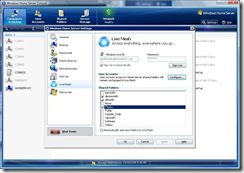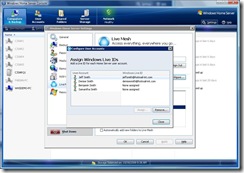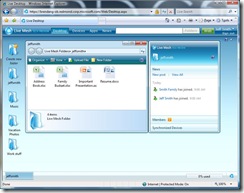Windows Home Server and Live Mesh Technology Demonstration
The Professional Developers Conference (PDC) is an event where Microsoft employees that sit behind one or more displays banging out lots of cool code on a daily basis get to venture out and meet other developers outside of Microsoft. Teams often showcase various technology demonstrations to highlight future possibilities along with sharing tips and techniques for building cool add-ins or other extensions to Microsoft products and service offerings.
Yesterday at PDC 2008, CJ Saretto, Brendan Grant and Doug Berrett co-presented the "Exposing Connected Home Services to the Internet Via Windows Home Server" which provided lots of great information about using the Windows Home Server platform to help deliver on the promise of a connected home.
The abstract for the session is:
Learn how to leverage the Remote Access platform in Windows Home Server to expose on-premises services running in the connected home to the Internet. See how to expose a home automation service running on Windows Home Server to the Internet, and watch a demonstration that shows how to expose services that may be hosted on other devices inside the connected home using Windows Home Server as a gateway. Finally, see a sneak preview of Home Server and Live Mesh working together to further enhance the remote experience for the connected home.
At the end the team provided a glimpse of some of the integration possibilities between the Windows Home Server product and Live Mesh service. The Windows Home Server and Windows Live Mesh teams are working closely together to define and develop a set of solutions that take advantage of the unique features of Windows Home Server and Windows Live Mesh.
Highlights of the technology demonstration included the following:
- A Windows Home Server Add-in that enables a user to add their home server to Live Mesh
- Windows Home Server could be enabled as a device in a person's Live Mesh and multiple people in the family could be provided access to their home server shared folders through their personal Mesh.
- Windows Home Server enables users to have an extensible storage solution
- Live Mesh enables users to selectively synchronize and access their files and media stored on their their home server with other devices in their mesh, such as their personal computer and mobile phone.
As Live Mesh is just entering a beta program, the Windows Home Server team and Live Mesh teams do not have any definitive dates or delivery vehicles defined for the solutions showcased in the technology demonstration. However, we are excited about the possibilities and hope you are too ...
If you don't have a home server yet, now might be the time to get one ...
t.
Comments
Anonymous
January 01, 2003
Microsoft have put another PDC session online featuring Windows Home Server, this session looks at howAnonymous
January 01, 2003
The comment has been removedAnonymous
January 01, 2003
PingBack from http://mstechnews.info/2008/10/windows-home-server-and-live-mesh-technology-demonstration/Anonymous
January 01, 2003
The comment has been removedAnonymous
January 01, 2003
This is good! I've been finding myself using Mesh more and more for simple file transfers and wondering how I could use it with my WHS. I mean, really, I can access any folder on my WHS through the web interface, but Mesh would streamline that system. Plus it's a little easier than the web interface.Anonymous
January 01, 2003
Interesting Demo showing Winows Home Server , which already has some very interesting remote access capabilitiesAnonymous
January 01, 2003
A Mesh addin for WHS. This would be really slick.Anonymous
January 01, 2003
I'm not quite sure I see how this fits into the whole Windows Home Server paradigm. So I have a folder on my computer, say Reports. And I want it stay synced on my desktop and my laptop and backed up on my server. Also, I want to access it in the cloud. So I make it a live mesh folder, but then what do I do on WHS. Do i go in and add the live mesh folder there through live mesh, or on the Windows side do I add it as a folder to back-up? Thanks for the clarification. Andrew.

_thumb.jpg)


